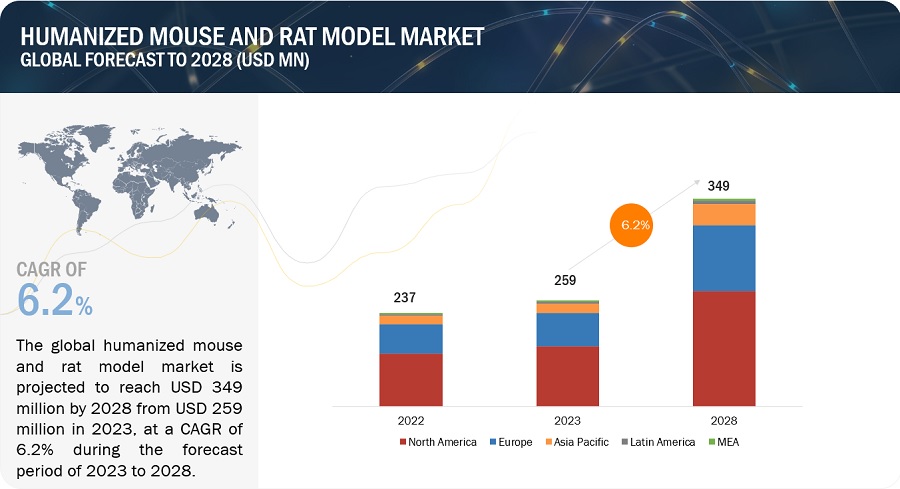Humanized Mouse and Rat Model Market in terms of revenue was estimated to be worth $259 million in 2023 and is poised to reach $349 million by 2028, growing at a CAGR of 6.2% from 2023 to 2028 according to a new report by MarketsandMarkets™.

Download an Illustrative overview:
https://www.marketsandmarkets.com/pdfdownloadNew.asp?id=131763955
Browse in-depth TOC on "Humanized Mouse and Rat Model Market"
140 - Tables
27 - Figures
188 – Pages
The North American market is projected to contribute the largest share for the humanized mouse and rat model industry
The global humanized mouse and rat model market is segmented into five major regions—North America, Europe, the Asia Pacific, Latin America, and the Middle East & Africa. North America is the largest regional market for humanized mouse and rat model market in 2022, while Europe is the second-largest market. US has emerged as the key revenue contributor to this region. The large share of the market is primarily driven by the rising funding for life sciences research and growing research on mAbs and biosimilars. The growing incidence of cancer is also expected to support market growth. According to the American Cancer Society, over 1.9 million new cancer cases will be diagnosed in the US in 2023.
Humanized Mouse and Rat Model Market Dynamics:
Drivers:
- Increasing research activities using humanized models
- Rising demand for personalized medicine
- Continuous support and initiatives from government and private sectors for cancer research
- Growing R&D activities in pharmaceutical and biotechnology sectors
Restraints:
- High cost of custom humanized models
- Laws and regulations for ethical use of animal models in research
Opportunities:
- Rising demand for humanized PDX models
- Emergence of CRISPR as a powerful tool in biomedical research
- Rising demand for humanized rat models
Challenges:
- Alternatives for animal testing
- Limitations of humanized mouse models
Key Market Players:
The prominent players in the global humanized mouse and rat model market include Charles River Laboratories (US), THE JACKSON LABORATORY (JAX) (US), Taconic Biosciences, Inc. (US), Crown Biosciences (US), Champions Oncology, Inc. (US), Hera BioLabs (US), genOway (France), Inotiv (US), Vitalstar Biotechnology (China), Ingenious Targeting Laboratory (US), TRANS GENIC (Japan), Harbour Antibodies BV (Netherlands), Oncodesign (France), Pharmatest Services (Finland), Ozgene Pty Ltd. (Australia), TransCure services (France), Cyagen Biosciences (US), Aragen Life Sciences Ltd. (India), GemPharmatech (China), and Biocytogen (US).
Request 10% Customization:
https://www.marketsandmarkets.com/requestCustomizationNew.asp?id=131763955
Recent Developments:
- In January 2022, Taconic Biosciences, Inc. (US) launched the huNOG-EXL EA (early access) humanized immune system (HIS) mouse.
- In October 2021, The Jackson Laboratory (US) acquired RMS Business of Charles River Laboratories Japan, Inc. (Japan) which is Charles River Laboratories Japan's Research Models & Services (RMS) business as a wholly-owned subsidiary.
- In September 2021, Biocytogen (US) collaborated with Envigo (US) in order to support the research applications of the triple immunodeficient B-NDG mouse. Envigo is the exclusive provider of B-NDG mice in the US, Europe, and certain APAC regions.
- In March 2021, Charles River Laboratories International, Inc. (US) acquired Cognate BioServices, Inc. (US) a cell and gene therapy contract development and manufacturing organization (CDMO) offering comprehensive manufacturing solutions for cell therapies. The acquisition expanded Charles River's broad capabilities across the major CDMO platforms for cell and gene therapies.
Humanized Mouse and Rat Model Market Advantages:
- Predictive Validity: Humanized models closely mimic human physiology, genetics, and immune responses, providing a more accurate representation of human disease progression and treatment outcomes. This predictive validity enhances the reliability of preclinical data and improves the likelihood of successful translation to clinical trials.
- Reduced Ethical Concerns: Using humanized models reduces the need for animal testing on non-human species, addressing ethical concerns and promoting more humane research practices.
- Personalized Medicine: These models can be customized to replicate specific patient profiles or disease conditions, enabling personalized medicine approaches for tailored treatment strategies.
- Drug Efficacy and Safety Screening: Humanized models allow for rigorous assessment of drug efficacy and safety before progressing to human clinical trials, reducing the risk of adverse effects and optimizing the drug development process.
- Understanding Disease Mechanisms: By closely resembling human biology, these models offer valuable insights into disease mechanisms and underlying molecular pathways, advancing our understanding of complex diseases.
- Rapid and Cost-Effective Research: Humanized models can accelerate research timelines by providing faster results compared to traditional animal models. This efficiency reduces overall research costs and expedites the discovery of novel therapies.
- Translatability to Humans: The ability of humanized models to recapitulate human responses enhances the likelihood of successful translation of research findings to human patients, fostering more effective treatments.
- Targeted Therapies: Humanized models facilitate the evaluation of targeted therapies by replicating the specific molecular targets present in human diseases, aiding in the development of precision medicine approaches.
- Infectious Disease Research: Humanized models are particularly valuable in studying infectious diseases, allowing researchers to study pathogen-host interactions and test potential vaccines and antiviral treatments.
- Academic and Industry Collaboration: The widespread adoption of humanized models fosters collaboration between academic institutions, pharmaceutical companies, and biotech firms, encouraging a dynamic exchange of knowledge and resources to advance medical research collectively.
Overall, the humanized mouse and rat model market represents a pivotal advancement in the biomedical field, enabling researchers to overcome the limitations of traditional models and paving the way for more effective and personalized medical interventions in the future.
Related Links:

